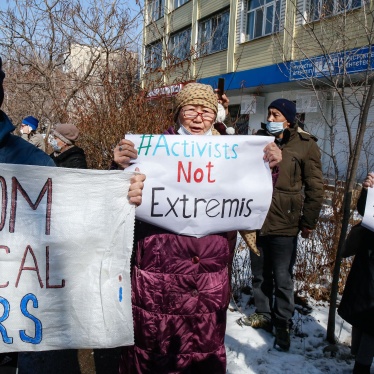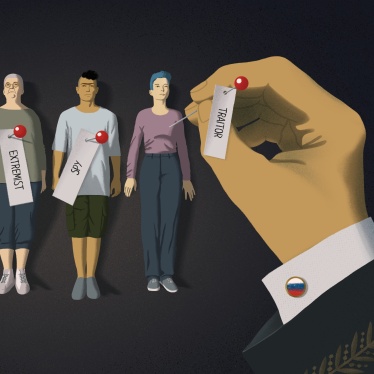(Bishkek) – Tajik authorities have detained, interrogated, and threatened relatives of 10 peaceful opposition activists who took part in a conference in Germany on July 9, 2017, in retaliation for the peaceful exercise of their fundamental rights, Human Rights Watch and the Norwegian Helsinki Committee said today.
Activists provided details about 10 incidents in cities around the country that have been sanctioned by the Tajik government at the highest level. Tajik security services officers and local officials publicly shamed, banned from leaving the country, and threatened to confiscate the property of the activists’ relatives, and in one case threatened to rape an activist’s daughter.
“The Tajik government’s vicious campaign of intimidation against dissidents’ relatives is widening and becoming ever more brazen,” said Steve Swerdlow, Central Asia researcher at Human Rights Watch. “The simultaneous actions by security services and local officials across numerous cities suggest a policy of collective punishment sanctioned at the highest levels, which should end immediately.”
Hundreds of political activists, including several human rights lawyers, have been jailed in the widening crackdown on free expression, and opposition parties banned. The authorities are also violating the rights of family members who remain in the country, primarily relatives of members of the Islamic Renaissance Party of Tajikistan (IRPT) and the opposition movement Group 24. National and local officials mobilize vigilante groups of “concerned citizens,” including school officials, who surround relatives’ homes and brand the families “enemies of the people.”
The latest string of attacks was retaliation against opposition activists who attended the July 9 conference in Dortmund, Germany, marking the twentieth anniversary of the signing of the Peace Accords that formally ended Tajikistan’s 1992-1997 civil war. On July 10, Tajik media reported that a pro-government security analyst, Saifullo Safarov, deputy director of the Strategic Research Center of the Office of the President of Tajikistan, appeared on national television condemning the opposition activists who attended the Dortmund conference. He stated that their attempts to unite into a coordinated opposition movement posed a “serious threat” to Tajikistan’s national security.
Earlier incidents of retaliation occurred in September and December 2016, when activists abroad engaged in peaceful protests.
IRPT activists provided detailed accounts to Human Rights Watch and the Norwegian Helsinki Committee about violations against their families committed by authorities between July 7 and July 10 in the capital, Dushanbe, and seven other villages and cities across the country. In each case, security services officers explicitly linked their visits and abusive actions to the participation of the people’s relatives in a peaceful political conference in Dortmund, Germany.
The United States, the European Union and its member states, and other international partners should urgently address the growing pattern of retaliatory attacks in Tajikistan as part of the wider deteriorating human rights situation there and publicly condemn the abuses, Human Rights Watch and the Norwegian Helsinki Committee said. Washington, Brussels, and other actors should consider asset freezes and visa denials to Tajik officials and government entities that take part in these abuses.
“The catalogue of retaliatory abuse in Tajikistan simply for exercising freedom of expression is staggering,” said Marius Fossum, Central Asia representative for the Norwegian Helsinki Committee. “No one should be publicly shamed, pressured to divorce their spouse, or be threatened with having their child raped or property arbitrarily confiscated under any circumstances, let alone for the exercise of basic human rights.”
Dangara
On July 7, 2017, police and security services officers in Sebiston, a village in Tajikistan’s southern Dangara district, went to the home of the parents of Jannatulloh Komilov, an IRPT activist now based in Germany. The officers berated Komilov’s elderly mother, Saima Kulova, for her son’s opposition activities, and questioned and intimidated his brothers, Zubaidulloh and Ubaidulloh Komilov. The officials threatened to confiscate the family’s home and adjoining land unless Jannatulloh Komilov ceases his participation in opposition activities abroad. Two days later, officials returned, detaining Komilov’s father-in-law, Zubaidulloh Atovulloev, overnight.
Kulob
On July 7 and 8, several security service officers in the southern city of Kulob threatened the Turkey-based IRPT activist Bobojon Kayumov’s mother and father at their family home. The officers stated that unless Kayumov ended his opposition work and specifically refrained from participating in the Dortmund conference they would “demolish” the family’s home. The officers then forced the two to record a videotaped statement condemning their son’s activities. On July 9, officers detained Kayumov’s father, holding him at the Kulob city security services facility until nighttime, and repeatedly interrogated him.
Vahdat
Jamshed Yorov is a Germany-based lawyer and the brother of Buzurgmehr Yorov. a lawyer imprisoned in Tajikistan since September 2015. He is serving a 25-year sentence following a flawed trial on politically motivated charges after publicly announcing he would represent jailed IRPT members. Jamshed Yorov participated in the Dortmund conference and made a public statement on July 9.
The next day security services officers went to his family’s home in Vahdat, Tajikistan, and told Yorov’s wife, Dilbar Zuhurova, that she and her children were barred from leaving Tajikistan and would be imprisoned if they tried to leave. Yorov told Human Rights Watch and the Norwegian Helsinki Committee that officers pressured Zuhurova to divorce him, promising to supply her with food and money if she agrees. They also threatened to rape Jamshed’s 15-year-old daughter.
Pandovchi Sari dasht Village, Nurobod District
On July 8, security service officers detained Asomuddin Saidov, father of Poland-based IRPT activist Islomiddin Saidov, in the village of Pandowchi Sari dasht in Tajikistan’s central Nurobod district. The officers took the father to the Dushanbe security services detention facility for interrogation. They showed Saidov pictures of his son taking part in peaceful demonstrations in Warsaw in September 2016 and threatened to take “necessary actions” against his son if he would not cease his political activism. The officers also visited Islomiddin’s sister’s home in Dushanbe seeking to interrogate her.
On July 9 and 10, Pandowchi Sari dasht village officials summoned the father in front of a group of “concerned citizens” while officials and others denounced his son and the entire family for their “treacherous” political activities against the government. Officials and other people publicly shamed Saidov and exhorted him to bring his son back to Tajikistan to face justice.
Pakhtakor Village, Jayhun Village Council, Khatlon Region
On July 8, security service officers in the village of Pakhtakor in Tajikistan’s southern Khatlon region visited the home of Abdumuslim Rustamov, brother of IRPT activist Iftikhor Rustamov, as well as the separate homes of Iftikhor’s sisters Sabohat Khodjaeva and Zarnigor Rustamova, interrogating them about Rustamov’s political activities. They threatened further problems if he continues his opposition political activity.
On July 11, security service officers in the same village took Masnavikhon Faizrahmonova, the mother of the Austria-based IRPT activist and spokesman Mahmudjon Faizrahmonov, to the local security services building to be interrogated about her son’s activities. The authorities held a public meeting where various village residents condemned Faizrahmonov and his brothers for their political activities. Faizrahmonov told Human Rights Watch and the Norwegian Helsinki Committee that the community had ostracized his family and that his mother’s health markedly deteriorated following the public shaming.
Khujand
On July 7 security service officers in the northern city of Khujand summoned relatives of IRPT activist Ilhomjon Yakubov to their facility, where the officers interrogated them for hours about his activities and threatened them with further unspecified “consequences” if he continues his political activism.
Rudaki
On July 8, authorities in the Rudaki district went to the home of Muhammadi Teshaev, the former head of the IRPT’s chapter in this area. They interrogated his family members and threatened to confiscate their house if Teshaev does not stop his political work.
Dushanbe
Before the Dortmund conference, security service officers in Dushanbe went to the family home of Poland-based IRPT activist Gulbarg Saifova, a relative of the exiled IRPT chairman Muhiddin Kabiri, who is also based in Europe. Officers forced Saifova’s parents to videotape a recording denouncing Saifova’s and Kabiri’s activities. Saifova ran for parliament in the March 2015 elections but was forced to flee the country and seek refuge in Poland due to persecution for her association with the IRPT.
On July 7, police in Dushanbe’s Firdavsi district visited the home of Europe-based IRPT activists Mijgona and Sayriniso Amonova and interrogated their father. Police officers called the women “traitors” and pressured their father to seek their return to Tajikistan so they could ask forgiveness of President Emomali Rahmon.









